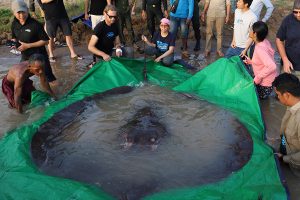Blighted by drought and climate change, overfishing, pollution, and massive dam construction, the plight of the Mekong River has been well-documented over the last 20 years. But Southeast Asia’s largest river system is still capable of producing the odd surprise or record catch.
Thanks to fishermen working around Koh Preah island near Stung Treng in Cambodia’s northeast, scientists say they can finally identify the world’s largest freshwater fish – a 300-kilogram female stingray, named Boremei by locals, Khmer for “full moon.”
Measuring four meters from snout to tail, the giant stingray broke the previous record set in Thailand where a 293-kilogram Mekong giant catfish was discovered in 2005. That fish died before it could be sold to environmental groups and – rather unfortunately – was divided between villagers and reportedly fed the community for several weeks.
The latest catch, made on June 13, was luckier and more significant on several fronts.
“In 20 years of researching giant fish in rivers and lakes on six continents, this is the largest freshwater fish that we’ve encountered or that’s been documented anywhere worldwide,” said Zeb Hogan, a biologist at the University of Nevada and head of the Wonders of the Mekong project.
“This is an absolutely astonishing discovery, and justifies efforts to better understand the mysteries surrounding this species and the incredible stretch of river where it lives.”
Stung Treng sits just below the Laos border and Four Thousand Islands, where the ground rises and the Mekong, at its peak, thunders through waterfalls and giant rock crevices, limiting fish migration.
Between Stung Treng and Kratie to the south lies a 200 kilometer stretch of river, which is home to a host of rare and endangered species, and the discovery of Boremei also offers some hope, given it was announced on the heels of a grim report about the Mekong dolphin.
Just 89 dolphins have been registered between Stung Treng and Kratie and deaths through illegal fishing are outpacing the dolphin’s ability to reproduce, which could undermine efforts to have these protected areas added to UNESCO’s World Natural Heritage List.
In 2020, the World Wildlife Fund reported scientists had discovered 224 new species of plant and vertebrate animals in the Greater Mekong region, covering Cambodia, Laos, Myanmar, Thailand, and Vietnam.
These species included 155 plants, 16 fish, 17 amphibians, 35 reptiles, and one mammal, taking the total number of new species found in this region to 3,007, made since 1997.
According to the University of Nevada, there are more than 30 species of freshwater fish that grow to more than two meters in length and can weigh more than 90 kilograms, including air-breathing arapaima, alligator gar, and carp as big as grizzly bears.
It also notes that recent studies show that global populations of giant freshwater species have plummeted by almost 90 percent in the past four decades, twice as much as the loss of vertebrate populations on land or in the oceans.
Boremei was released back into the Mekong after it was fitted with an acoustic tag, enabling biologists to learn more about the stingray’s behavior, the first for a stingray caught in Cambodia.
Scientists said the stingray, one of four sighted in recent months, appeared strong and healthy as it quickly descended into the murky depths of the river.
“This record fish highlights the important connection between people, fish, and freshwater,” said Hogan. “Large fish are bellwethers of the health of freshwater ecosystems worldwide – the fish are sending us a message and we need to listen to it.
“It is a signal to us to protect our rivers and lakes,” he said.

































